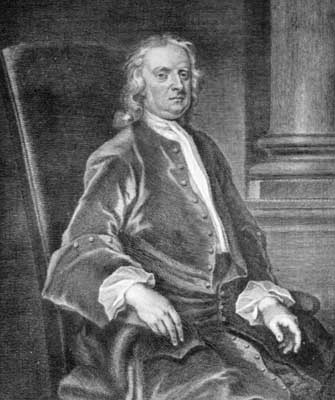
|
Born: 25 Dec 1642 in Woolsthorpe, Lincolnshire, England Died: 31 March 1727 in London, England |

As a young boy he was shy and thoughtful, he preferred to be alone, sketching and inventing; at age 12, he made a perfect working model of a famous windmill near his school. Water clocks, sundials and kites fascinated him, and he was a genius at mathematics. At age 18, he was accepted at Cambridge University where he was to spend most of the next 40 years, first as a student, then as a professor. Newton was remained very shy (he did not want to publish his ideas because they might attract attention and discussion that would require him to speak out in public. When the Great Plague broke out in 1666, he returned to his hometown, Woolsthorpe. This would be a very important year for Isaac. (He later called it his "miraculous year.") He had always loved how the stars and planets moved (actually how all things moved). He thought there were ways to explain all movement (motion) without some mysteriously heavenly forces, and it was his determination to prove his ideas that led to his many discoveries.
After the plague subsided, Newton returned to Trinity College, Cambridge, and in 1671, finally had his first book published. The Mathematical Principles of Natural Philosophy ("The Principia"), which some say is the most important scientific book ever written. Today, most every schoolchild knows the significance of the Newton-and-the-apple story: that Newton went on to articulate the law of gravity and then the three laws of motion. Less widely appreciated are his other contributions to understanding our universe--that he invented differential and integral calculus, made the first reflecting telescope, and discovered laws of optics, fluid mechanics and cooling.
In the early 1690s, Newton suffered what would now be called a nervous breakdown. His fame by then was a mixed blessing, people cheered him for his genius, at the same time critisized his ideas. Still, he rose to the challenges and opportunities that presented themselves: successfully running for Parliament, becoming Master of the Royal Mint (for which he was knighted) and eventually assuming the presidency of the Royal Society.
In 1727, after a lifetime of generally good health, he suffered a painful case of gallstones, which caused his death. In light of his remarkable contribution to human understanding, Newton was buried in Westminster Abbey.
